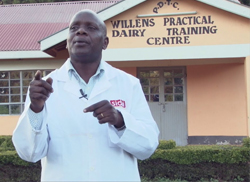
Despite the rural electrification programme solar has emerged as the preferred low cost option for many dairy farmers.
Some Sh12.4 billion worth of milk produced across the country in 2018 went to waste, according to the year’s Economic Survey. Blame for this atrocious wastage and subsequent financial losses has fallen mostly on poor handling and storage practices at the farm and primary markets. In fact, numerous studies have shown that poor milk handling and storage negatively affects the overall volume and quality of milk reaching markets across the country.
Imagine how much I save! I thank God I made that decision. In fact, buying the solar-powered cooler is among the best decisions I have ever made in my life as a dairy farmer
A USAID-KAVES survey found poor road networks, lack of appropriate cooling and storage facilities and lack or high cost of electricity in many areas, the major constraints to milk processing and marketing. Milk being highly perishable, keeping it fresh for days or weeks is often a great headache to dairy farmers, especially those who live far from milk collection points. However, some farmers are finding a solution to this problem in clean energy innovations such as solar milk coolers.
Take Willy Kirwa, for instance. His farm, Willens Dairy farm located about 10 kilometres from Eldoret on the Eldoret-Kapsabet Road, has become a model of how much difference innovation and a little gut to think outside of the box can make. Visitors to the farm are welcomed by a slogan “Happy Cow, Happy Farmer” on the Willens Practical Training Centre building. At any given time, this training centre can host between 50 and 60 farmers looking to bridge their knowledge gap in the dairy business.
It is hard not to notice the calves feeding on a tiled floor, or the sparkling dairy unit with a capacity of 40 cows. The unit is sub-divided into three sections for the high-yielders, low yielders and dry cows.
However, the major attraction is the one of a kind solar-powered milk cooler. Kirwa imported the system from the United States after learning about it through the Internet.
“I actually went for the whole system except the container and a few other things that were available locally,” he says.
It cost him about Sh5 million, inclusive of transport and installation, which was done by experts from the US. While a conventional electric cooler would have cost him less than half that, Kirwa says he doesn’t regret his decision. On average, he estimates, he would be incurring electricity bills to the tune of about Sh60,000 each month with an electric cooler.
“Imagine how much I save! I thank God I made that decision,” he says. “In fact, buying the solar-powered cooler is among the best decisions I have ever made in my life as a dairy farmer’’. In addition, he earns between two and three shillings more per litre from New Kenya Cooperative Creameries (New KCC) for his deliveries as his milk is of high quality and cooling a value addition. At any given time, the cooler has a capacity of 600 litres. It runs at 3.7 to four degrees centigrade, and Kirwa says, he stores for between three and four days especially when schools are closed. This means he does not have to desperately seek a market for his produce, but can comfortably keep the milk for longer, as he looks for the best price. His favourite clients are neighbouring schools as they buy milk in bulk at Sh50 a litre, compared to New KCC’s average of Sh35.
He, however, ensures he delivers some to the more consistent processor. To ensure maximum hygiene standards and minimise chances of contamination, few people are allowed into the cooler, especially when it is loaded with milk.
“I also keep the cooling tank clean all the time,” he says. Isn’t he worried about the days when there is literally no sunshine?
“No,” he says.
The solar panels can reserve energy for up to three days. “Besides, they need just minimal light to recharge, and the area rarely goes for a day without that minimal light anyway.”
Did you know?
Most small-scale dairy farmers often work under conditions where power supply is either absent or unreliable. Ice packs are used instead of batteries for storing energy and magnifying the cooling power of the fridge. Waste heat from the cooling process is used for generating hot water that is needed for cleaning milk equipment and containers – The Reload Project
